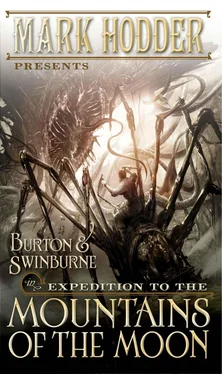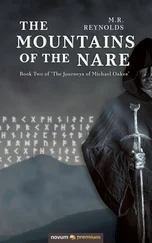Mark Hodder - Expedition to the Mountains of the Moon
Здесь есть возможность читать онлайн «Mark Hodder - Expedition to the Mountains of the Moon» весь текст электронной книги совершенно бесплатно (целиком полную версию без сокращений). В некоторых случаях можно слушать аудио, скачать через торрент в формате fb2 и присутствует краткое содержание. Жанр: sf_stimpank, на английском языке. Описание произведения, (предисловие) а так же отзывы посетителей доступны на портале библиотеки ЛибКат.
- Название:Expedition to the Mountains of the Moon
- Автор:
- Жанр:
- Год:неизвестен
- ISBN:нет данных
- Рейтинг книги:5 / 5. Голосов: 1
-
Избранное:Добавить в избранное
- Отзывы:
-
Ваша оценка:
- 100
- 1
- 2
- 3
- 4
- 5
Expedition to the Mountains of the Moon: краткое содержание, описание и аннотация
Предлагаем к чтению аннотацию, описание, краткое содержание или предисловие (зависит от того, что написал сам автор книги «Expedition to the Mountains of the Moon»). Если вы не нашли необходимую информацию о книге — напишите в комментариях, мы постараемся отыскать её.
Expedition to the Mountains of the Moon — читать онлайн бесплатно полную книгу (весь текст) целиком
Ниже представлен текст книги, разбитый по страницам. Система сохранения места последней прочитанной страницы, позволяет с удобством читать онлайн бесплатно книгу «Expedition to the Mountains of the Moon», без необходимости каждый раз заново искать на чём Вы остановились. Поставьте закладку, и сможете в любой момент перейти на страницу, на которой закончили чтение.
Интервал:
Закладка:
Lawless said, “Well, chaps, we'll never achieve any of that if we don't get under way, so I'd better check that my ship is flight ready. We'll be off in ten minutes. I'll leave you to say your goodbyes.” He gave a nod to Mayne and Monckton Milnes, touched a finger to the peak of his cap, and walked up the ramp and into the Orpheus.
Sir Richard Mayne drew Trounce aside and engaged him in a quiet conversation.
Monckton Milnes grasped Swinburne's hand and gave it a hearty shake. “Good luck, young 'un,” he said. “You stay safe, do you hear me?”
“Perfectly well, old horse,” Swinburne replied. “Don't you fret about me. I'll be fine. I'm too slight a morsel for a lion or crocodile to bother with, and I plan to keep myself soaked in gin to fend off the mosquitoes.”
“Good lad! I look forward to some inspired poetry upon your return.”
Swinburne caught Mayne's eye, gave him a salute, and boarded the ship.
“Are you sure he's up to it, Richard?” Monckton Milnes asked Burton. “As much as I admire him, he's the very last person I'd expect to be trekking through Africa.”
Burton gave a wry smile. “You know as well as I do that he's far from the delicate flower he appears. He's a tough little blighter and I need his insight into the Naga business. Anyway, he'd never forgive me if I left him behind.”
“And you? What of your health? Last time you tried for the Nile you were blinded and crippled for months on end.”
“True, but mostly because John Speke was pouring huge doses of Saltzmann's Tincture into me. But that aside, we have Sister Raghavendra with us. That should make a considerable difference to our well-being.”
Monckton Milnes nodded thoughtfully. “The Sisterhood of Noble Benevolence is a confoundedly strange organisation. I've never understood how they move around the East End without coming to harm. You know there's a rumour they possess some sort of supernatural grace that protects them?”
“I've heard as much, yes. It may be that their ability to heal and soothe is, indeed, supernatural. Perhaps it's another effect of the resonance from the Naga diamonds. Whatever the explanation, I'm sure she'll prove a most valuable member of the expedition.” Burton looked up at the grey sky. “Africa again,” he muttered. “Maybe this time-”
“You aren't obliged to put yourself through it, Richard,” Monckton Milnes interrupted. “Palmerston can find other pawns for his chess game.”
“For certain. But it's not just the diamond business. I want the Nile. Every day, I ask myself, ‘Why?’ and the only echo is, ‘Damned fool! The devil drives!’ That bloody continent has been shaping my life for nigh on a decade and I feel, instinctively, that it hasn't finished with me yet.”
“Then go,” said Monckton Milnes. “But Richard-”
“Yes?”
“Come back.”
“I'll do my level best. Listen, old chap, on the subject of Palmerston, there's something you might do for me while I'm away.”
“Anything.”
“I'd like you to keep an eye on him. Follow, especially, his foreign policies with regard to Prussia, the other Germanic states, and Africa. You are one of the most politically astute men I know, and you have a plethora of friends in high places. Use them. When I return, I'll need you to give me an idea of which way the wind is blowing where our international relations are concerned.”
“You think he's up to something?”
“Always.”
Monckton Milnes promised to do everything he could.
They shook hands and bade each other farewell.
Detective Inspector Trounce returned and joined Burton on the gangplank.
With a final wave to their colleagues, the two men entered the rotorship.
The great swathe of the world's territory that Britain had once controlled was still referred to, in its final days, as the Empire, even though there'd been no British monarch since the death of Albert in 1900. “The King's African Rifles” was a misnomer for the same reason. Traditions die hard for the British, especially in the Army.
Two thousand of the KAR, led by sixty-two English officers, had set up camp at Ponde, a village about six miles to the south of Dar es Salaam and four miles behind the trenches that stretched around the city from the coast in the northwest to the coast in the southeast. Ponde's original beehive huts were buried somewhere deep in a sea of khaki tents, and their Uzaramo inhabitants-there were fewer than a hundred and fifty of them-had been recruited against their will as servants and porters. Mostly, they dealt with the ignominy by staying as drunk as possible, by running away when they could, or, in a few cases, by committing suicide.
Perhaps the only, if not happy, then at least satisfied villager was the man who brewed pombe -African beer-who'd set up a shack beneath a thicket of mangrove trees from which to sell the warm but surprisingly pleasant beverage. The shady area had been furnished with tables and chairs, and thus was born a mosquito-infested tavern of sorts. No Askaris permitted! Officers and civilians only!
It was eleven in the morning, and the individual who now thought of himself as Sir Richard Francis Burton was sitting at one of the tables. It was an oppressively humid day and the temperature was rising. The sky was a tear-inducing white. The air was thick with flies.
He'd refused pombe -it was far too early-and had been provided with a mug of tea instead, which sat steaming in front of him. His left forearm was bandaged. Beneath the dressing there was a deep laceration, held together by seven stitches. His face, now more fully bearded, was cut and bruised. A deep gash, scabbed and puckered, split his right eyebrow.
He dropped four cubes of sugar into his drink and stirred it, gazing fixedly at the swirling liquid.
His hands were shaking.
“There you are!” came a high-pitched exclamation. “Drink up. We have to get going.”
He raised his eyes and found Bertie Wells standing beside him. The war correspondent, who looked much shorter and stouter in broad daylight, was leaning on crutches and his right calf was encased in a splint.
“Hello, old thing,” Burton said. “Take the weight off. How is it?”
Wells remained standing. “As broken as it was yesterday and the day before. Do you know, I snapped the same bally leg when I was seven years old? You were still alive back then.”
“I'm still alive now. Get going to where?”
“Up onto the ridge so we can watch the bombing. The ships should be here within the hour.”
“Can you manage it? The walk?”
Wells flicked a mosquito from his neck. “I'm becoming a proficient hobbler. Would you do me a favour, Sir Richard? Next time I pontificate about the unlikelihood of a direct hit, will you strike me violently about the head and drag me clear of the area?”
“I'll be more than happy to. Even retrospectively.”
“I must say, though, I thoroughly enjoyed the irony of it.”
“Irony?”
“Yes. You affirm that you are quite impossibly in the land of the living, and seconds later, you almost aren't!”
“Ah, yes. Henceforth, I shall choose my words with a little more care. I did not at all enjoy being bombed and buried alive. And please drop the ‘Sir.’ Plain old ‘Richard’ is sufficient.” He took a gulp of tea and stood up. “Shall we go and watch the fireworks, then?”
They left the makeshift tavern and began to move slowly through the tents, passing empty-eyed and slack-faced soldiers, and heading toward the northern border of the encampment.
The air smelled of sweat-and worse.
“Look at them,” Wells said. “Have you ever seen such a heterogeneous throng of fighting men? They've been recruited from what's left of the British South Africans, from Australia and India, from the ragtag remains of our European forces, and from all the diverse tribes of East and Central Africa.”
Читать дальшеИнтервал:
Закладка:
Похожие книги на «Expedition to the Mountains of the Moon»
Представляем Вашему вниманию похожие книги на «Expedition to the Mountains of the Moon» списком для выбора. Мы отобрали схожую по названию и смыслу литературу в надежде предоставить читателям больше вариантов отыскать новые, интересные, ещё непрочитанные произведения.
Обсуждение, отзывы о книге «Expedition to the Mountains of the Moon» и просто собственные мнения читателей. Оставьте ваши комментарии, напишите, что Вы думаете о произведении, его смысле или главных героях. Укажите что конкретно понравилось, а что нет, и почему Вы так считаете.












